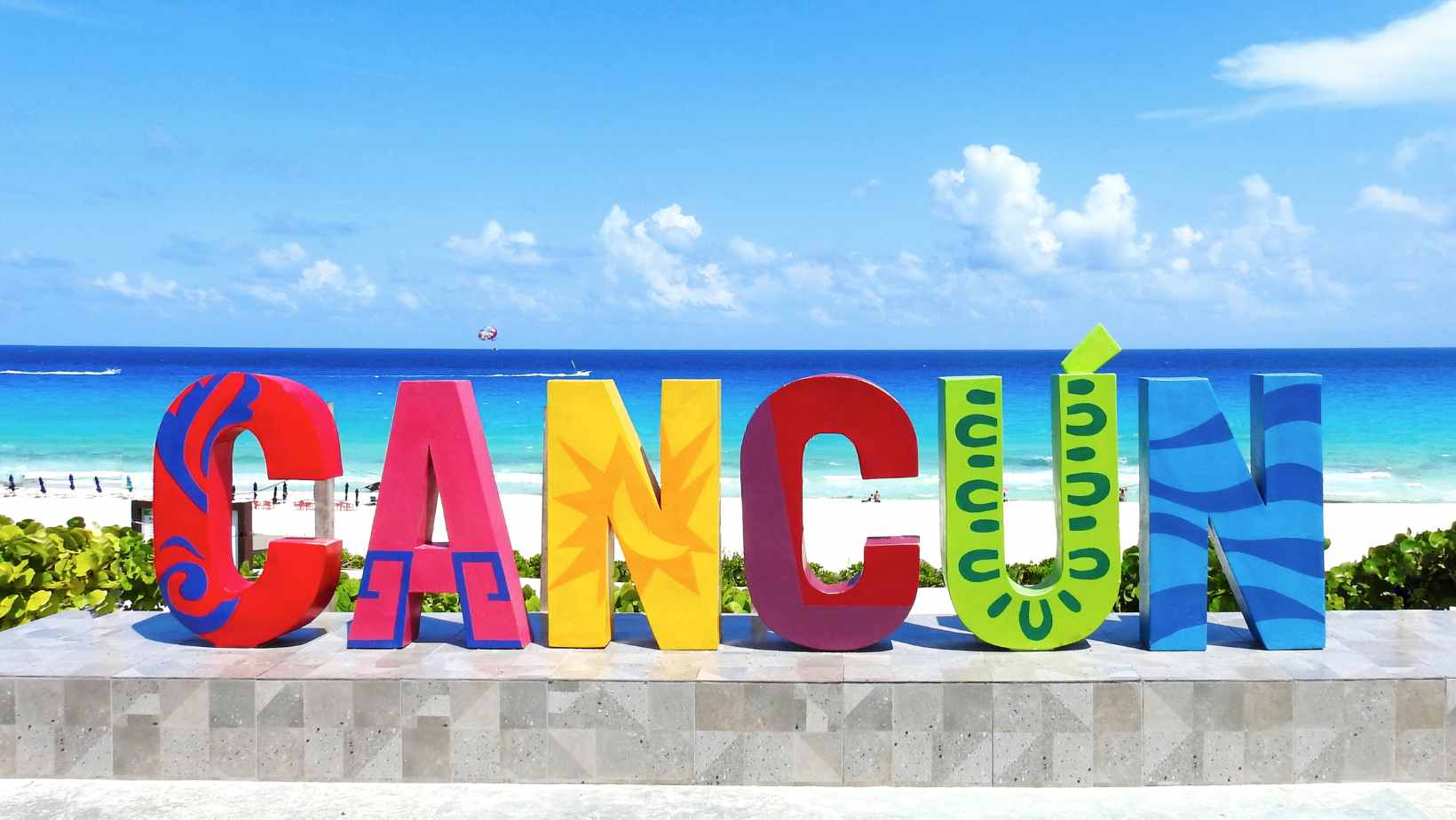
Getting Around Cancun Mexico
What Documents Do i Need to Travel to Cancun Mexico
To ensure hassle-free travel to Cancun, you need to have all the necessary documents for your trip. In order to help you with this, we have put together a section on the required travel documents for Cancun with sub-sections including passport, visa (if applicable), tourist card (FMM), and return/onward ticket. Keep reading to learn more about each of these essential documents.
Passport
For travelers to Cancun, a crucial travel document is the Personal Identity Verification Document, which proves one’s identity and nationality. This document can be represented either by a passport card or book variant.
Below is a table presenting the necessary details of having a valid passport for Cancun:
| Passport | Details |
| Type | Passport cards and books are accepted. |
| Validity | Must have at least 6 months validity upon entry. |
| Renewal | Passports must be renewed if it expires within 6-months after your return date from Mexico. |
A unique detail about Cancun requirements is that minors under 18 years old might require additional documentation such as Authorization for Minors Traveling Outside of Mexico form signed by their parents and/or other legal documents of travel authorization.
According to the U.S Department of State, over 12M United States citizens visited abroad in 2019.
Hope your passport photo looks like you because Cancun border officials don’t deal well with surprises.
Visa (if applicable)
For travel to Cancun, visa requirements vary depending on the country of origin. Visitors from some countries may require a visa, while others may be granted a specified number of days of stay upon arrival. It’s advisable to check with the Mexican embassy or consulate in your country to determine if you need a visa for travel to Cancun.
If a visa is required, it’s crucial to make sure that all necessary documentation is obtained well ahead of time. This documentation typically includes identification documents, passport-size photos and proof of financial support.
In addition to a visa, foreign nationals may also be required to provide other documentation such as health certificates or special permits. Make sure to check which documents are needed as per your country and fulfill them accordingly.
To ensure smooth travel and avoid unnecessary delays, it’s essential to have all necessary paperwork in order before traveling to Cancun. Consider consulting with an experienced travel agent or immigration attorney who can assist with obtaining the correct documentation.
Get ready for some paperwork fun in the sun with the Tourist Card, because nothing screams vacation like filling out forms.
Tourist Card (FMM)
For international trips to Cancun, Mexico, a vital travel document required for all tourists is the Forma Migratoria Multiple (FMM), known as the Tourist Card. This card allows visitors to stay in the country for up to 180 days.
To obtain the Tourist Card (FMM), travelers can acquire it online or at Mexican border crossings. It’s best to apply for it ahead of time to avoid long wait times. The Tourist Card (FMM) includes personal information such as name, nationality, and passport details.
| Document | Tourist Card (FMM) |
| Purpose | To allow visitors to stay in Mexico for up to 180 days. |
| Application method | Online or at Mexican border crossings. |
Moreover, keep in mind that the Tourist Card (FMM) needs to be surrendered upon exiting Mexico. If lost, there may be a fine associated with replacement.
A friend of mine once forgot to surrender her Tourist Card (FMM) while leaving Cancun International Airport. She was stopped by the officials and had to pay a fine before she could board her flight home. Therefore, make sure you have all required documents in order when traveling internationally.
Don’t forget your return ticket unless you want to extend your Cancun vacation into a permanent stay at the airport.
Return/onward ticket
To enter Cancun, one must possess proof of departure from the country or onward ticket confirmation. A valid passport and approved visa are also essential documents to bring for entry into the country.
Without a return/onward ticket from Cancun, one can be denied entry into the country, which could cause them financial losses and inconvenience. This requirement is enforced by airlines and airport personnel to ensure compliance with immigration laws and prevent visitors overstaying their visa.
It is advisable to keep copies of all travel documents and identification cards while travelling to avoid delays or complications during check-in, airport security checks and border control. Additionally, it’s important to monitor flight schedules regularly for any changes in flights that may require updating of departure or arrival times.
Pro Tip: Keeping multiple copies of necessary travel documents both digital and hard-copy in different places ensures that you don’t lose everything if something happens to your primary document holder.
Transport yourself to relaxation and margaritas with Cancun’s transportation options, just don’t forget your driver’s license (and sense of adventure).

Transportation in Cancun
To navigate your way around Cancun, you need to have a solid plan in place for transportation. In order to make your trip to Cancun a success, you need to carefully consider your transportation options. Luckily, you have two main solutions for getting around Cancun: airport transportation and public transportation.
Airport Transportation
Traveling to Cancun and need a reliable way to get from the airport? Look no further! Transportation from Cancun International Airport to your hotel or destination is readily available. Choose from private transfers, shared shuttles, or taxis. Private transfers offer personalized service with no other stops, while shared shuttles allow you to share the ride and cost with other travelers. Taxis are widely available at the airport but may be more expensive than pre-arranged transportation options.
One thing to keep in mind is that official taxi rates are posted at the airport, and it’s best to agree on a price before starting your journey. Expect to pay around $40-$60 for a one-way trip from the airport to hotels in the Cancun Hotel Zone.
It’s crucial to book your transportation in advance before traveling, as this will save you time and hassle after landing. Various companies specialize in providing transport services from the airport, so take your time while choosing an option that fits your needs and budget.
Fun Fact: Did you know that Cancun International Airport was named Latin America’s Leading Airport at World Travel Awards 2021? Amazing right!
If you think airport taxis are expensive, wait till you try to negotiate with a horse and carriage driver in Cancun.
Taxi
Getting around Cancun is easy with various modes of transportation available. Among them, hailing a ride on the street or calling a taxi service is a prevalent and convenient option for visitors to move around the city.
Taxis are plentiful in Cancun, and they come in different colors, with white being the standard. They operate 24/7 and can be hailed from the streets or booked through your accommodation or by phone. It’s advisable to negotiate the fare before starting your ride to avoid any misunderstanding later on. Also, make sure that the taxi has a visible identification number on it to ensure your safety.
In addition to standard taxis, private airport taxis and shuttle services are also widely available at fixed prices based on the destination. It’s recommended to book these services in advance to avoid any inconvenience upon arrival at Cancun International Airport.
When taking a taxi in Cancun, be aware of scams like fake currency exchanges or drivers who will try to overcharge you. Always have small change available, as some taxis may claim not to have change for larger bills.
Don’t miss out on exploring all that Cancun has to offer by utilizing its array of transportation options. So go ahead and plan your trip wisely!
Why take a shuttle bus when you can experience true Mexican transportation and ride a donkey instead?
Shuttle Bus
If you’re looking for efficient and comfortable transport around Cancun, consider the shuttle bus service.
For the variation of the previous heading, we suggest “The Shuttle Experience” and have created a table below with relevant details:
| The Shuttle Experience | |
| Duration | 30-45 minutes |
| Frequency | Every 30 minutes |
| Cost | $12 per person |
When using this mode of transportation, you’ll appreciate how easy it is to get around all the hotspots in town. Beyond the efficiency and affordability of the shuttle buses, it’s great not having to worry about navigating unfamiliar roads or finding parking.
One traveler recalls her experience taking the shuttle bus from her hotel to downtown Cancun:”I was pleasantly surprised by how punctual and comfortable the ride was. Plus, I appreciated all the insider tips that our driver shared with us on where to find tasty local cuisine!”
Who needs a partner in crime when you can rent a car in Cancun and go on a solo adventure?
Car Rental
Cancun, being a famous tourist destination, offers several transportation options for visitors. One of these options is the facility to rent cars.
To help tourists plan their transportation better, here is information on the availability and cost of car rentals in Cancun.
| Rental Company | Price Range (per day) | Location |
| Avis | $35 – $95 | Cancun Airport & Hotel Zone |
| Hertz | $30 – $100 | Cancun Airport & Hotel Zone |
| National Car Rental | $28 – $80 | Cancun Airport & Hotel Zone |
Visitors must possess a valid driver’s license and must be at least 21 years old to rent a car in Cancun. There are additional charges for any extra drivers or insurance coverage that visitors opt for.
One can drop off the rental vehicle at any location specified by the company and return home stress-free.
While renting a car can provide flexibility and independence while exploring Cancun, it’s important to familiarize yourself with local driving laws and regulations.
A friend of mine, who rented a car during her trip to Cancun, shared that it was worth every penny as it allowed her to visit places at her own pace without having to worry about taxi costs. She mentioned taking necessary precautions while driving due to unfamiliar roads but overall had an enjoyable experience.
Why take a taxi when you can take a wild ride on a colectivo and experience the true meaning of go big or go home in Cancun’s public transportation.
Public Transportation
Cancun is equipped with an efficient and accessible transportation system that is instrumental in connecting different parts of the city. The city has a well-organized network of public transportation that includes buses and taxis, which provide easy access for visitors to explore different places in Cancun.
Buses are one of the popular modes of public transportation used by both locals and tourists. These buses offer an affordable option to travel across the city and come in three types – ADO, R-1, and R-2. ADO buses are air-conditioned, spacious and offer an express service for long distances that travel to other cities as well. On the other hand, R-1 buses operate on the Hotel Zone route, while R-2 buses primarily service the downtown area.
Taxi services are also available throughout Cancun for those who prefer a more convenient mode of transport. Taxis can be hailed from designated cab stands or booked through ride-sharing platforms such as Uber or Didi. The fares may vary depending on the distance being traveled and time-of-day.
Notably, shuttle services that run between hotels and attractions are also present alongside similar tours offered by private operators that are a great way to explore Cancun at your own pace.
Pro Tip: It’s always recommended to settle on a fare before starting your journey when taking a taxi to avoid any misunderstanding later on.
Why take a taxi when you can experience the thrill of a rollercoaster on the local buses in Cancun?
Buses
Public Transportation in Cancun
The public transportation in Cancun is well-organized and convenient for tourists. Buses are a popular mode of transportation for locals and visitors alike.
- Buses operate all over Cancun, covering major tourist spots like hotels, beaches, shopping malls and downtown areas.
- The buses have fixed routes and timings, making it easy for tourists to plan their trip accordingly.
- A single bus ride costs MXN 12 (less than USD 1), making it an affordable way to travel around Cancun.
- The buses are air-conditioned and comfortable, with regular stops along the route.
For those who prefer a more private mode of transportation, taxis are easily available too.
Apart from buses and taxis, tourists can also rent cars to explore the city at their own pace.
A unique feature of the Cancun public transportation system is its “Ruta Naranja” or “Orange Route.” This is a special tourist bus that takes visitors on a scenic tour of the Hotel Zone and downtown areas. It includes stops at popular sights like Market 28 and Plaza Las Americas.
One tourist shared her experience of using the public bus system in Cancun during peak season – “I was worried that the buses would be overcrowded but they were surprisingly efficient. I was able to visit multiple places in one day without worrying about getting lost or spending a lot of money on transportation.”
Overall, the public transportation system in Cancun offers tourists an easy and affordable option to travel around the city.
Why take a taxi when you can take a wild ride on a local bus and experience the true meaning of adventure in Cancun?
Taxis
Taxis in Cancun
Taxis are a convenient option for transportation in Cancun.
- Taxis can be hailed on the street or found at taxi stands.
- Fares are regulated and must be paid in cash, so it’s recommended to carry small bills.
- There are two types of taxis: white taxis, which have meters and operate within the city limits, and yellow taxis, which do not have meters and can operate outside of the city.
- Tipping is not required but appreciated for good service.
- It’s important to confirm the fare with the driver before starting the ride to avoid any misunderstandings.
It’s worth noting that while taxis are generally safe in Cancun, it’s advisable to only use official city-regulated taxis with proper licenses.
For those seeking a more budget-friendly option, shared shuttle services such as ADO are available at the airport and hotels. These shuttles may take longer than a taxi due to multiple stops but offer a more affordable rate.
Overall, choosing a transportation method ultimately depends on one’s needs and preferences. However, taking necessary safety precautions should always be a priority when traveling to unfamiliar destinations like Cancun.
Colectivos in Cancun: Where strangers become your personal space invaders.
Colectivos
Colectivos are a popular form of transportation in Cancun. These shared vans can accommodate up to 15 passengers and offer affordable fares for traveling around the city. They usually have set routes, so it’s important to know which one to take depending on your destination.
To catch a colectivo, simply wave them down on the side of the road or wait at designated stops. It’s recommended to have small bills or coins ready as they often don’t provide change and prefer exact fares.
One unique detail about colectivos is that they can be flagged down anywhere along their route and dropped off at any point as long as it’s safe. This makes it convenient for travelers who need to make multiple stops or get off closer to their destination.

To ensure safety during colectivo rides, make sure to wear seatbelts if available and be mindful of your belongings. Also, do not hesitate to speak up if you feel uncomfortable with the driving behavior or if someone tries to take advantage of you.
Overall, taking a colectivo is a great way to experience local culture and save money on transportation costs in Cancun. Just remember to plan your route ahead of time, carry small bills for payment, and stay alert during the ride.
Better bring your passport, because getting deported from Cancun would really put a dent in your vacation plans.
Other Essential Documents
To ensure your trip to Cancun is seamless, it’s important to have all the documents you need. In order to meet this requirement, we have prepared a section called “Other Essential Documents” with sub-sections that will provide you with solutions to any potential issues. These sub-sections are Travel Insurance, Emergency Contact Information, Medical Documents, and Currency and Financial Documents.
Travel Insurance
When venturing abroad, it’s important to consider policies safeguarding against unforeseen events – such as travel coverage positions. These insurances provide for potential health or journey setbacks while overseas. They can range from medical fee repayment in case of illness or injury to cancelation insurance if one’s trip doesn’t fit their time schedule or becomes unfeasible due to unforeseen conditions.
In addition to health and journey risks, there are other factors that you might want coverage for as well while planning your break getaway. Traveling is full of uncertainties and sometimes, things just don’t go as imagined. So, having a backup plan for delayed flights or lost luggage can definitely save your day.
Bear in mind that various insurers have different functionality arenas; don’t overlook limitations and excellent print details. Always choose a policy that satisfies all your requirements and gives peace of mind on your expedition.
You should also secure other essential documents such as passports, visas and identification proofs. Failing to produce original travel permits when required may result in penalties leading to unnecessary delays or even cancellation of trips.
According to the U.S State Department, around 300k Americans lose their passports every year due to thefts, carelessness or frauds. Hence, always keep a copy of essential documents with yourself and hotels’ lockers if possible.
Be safe by being proactive- these practical tips help avoid any unpleasant surprises and help you enjoy carefree trips!
When you’re in a crisis, your emergency contacts are like Batman and Robin – they come to the rescue faster than you can say ‘Holy paperwork, Batman!’
Emergency Contact Information
In case of an unexpected situation, having access to pertinent contact information is essential. Here is a variation of Emergency Contact Information that you should include in your documents:
- Relevant People: List the names and phone numbers of people who are associated with your personal and professional life.
- Medical Details: Provide your medical history, details about any ongoing treatment, and contacts for healthcare providers.
- Insurance Information: Share names of insurance companies along with policy numbers, relevant agents’ phone numbers, etc.
It is imperative to keep this list updated at all times because minor changes could be helpful to prevent significant problems in a time of crisis.
Once I was travelling alone across countries and had an unfortunate accident. I was grateful for the comprehensiveness of my document list since the contacts provided made sure I received timely assistance and support. Make sure your medical documents are up to date, because “I’m allergic to penicillin” is not a great pick-up line at the hospital.
Medical Documents
When it comes to managing one’s health, several necessary documents should be kept updated. These documents include medical records, insurance information and prescriptions. It is critical to keep an updated document of all pre-existing conditions, allergies and medications regularly. This record will enable healthcare providers to deliver the best individualized care catered for your specific needs.
Moreover, advanced directives such as living wills and healthcare power of attorney may also be included under this category of essential documents. Advanced directives allow individuals to outline their wishes for end-of-life care and assign a trusted person to make medical decisions on their behalf if they become incapacitated.
It is crucial to ensure that all medical documents are accurate, up-to-date, and accessible when needed to avoid any delays or misinterpretations in treatment.
According to a recent study by the American Medical Association Journal of Ethics, nearly 90 percent of Americans believe that doctors need access to electronic health records (EHRs) quickly during emergencies.
Your wallet may feel lighter, but always keep your financial documents heavy with evidence of your wealth.
Currency and Financial Documents
When it comes to important documentation for traveling abroad, financial and currency-related documents are crucial. Below is a table outlining some of the essential financial and currency documents to consider when traveling overseas.
| Financial and Currency Documents | Description |
| Passport | Primary identification for international travel |
| Visa (if applicable) | Allows entry into specific countries |
| Traveler’s cheques or cash | Emergency money for unforeseen circumstances |
| Credit/debit cards | Accepted in most countries as a payment method |
| Bank statements | Easily accessible with online banking |
It’s important to also note that different countries may require additional documentation, such as proof of funds or proof of employment, so research should always be done prior to departing. Additionally, keeping a copy of all financial documents in a secure location can be extremely valuable in case any issues arise while traveling.
To ensure smooth travels without financial complications, here are some suggestions:
- Notify your bank or credit card company of your travel plans to avoid any account holds or fraud alerts.
- Withdraw cash from ATMs located inside banks to ensure security and avoid skimming devices.
- If using debit/credit cards, carry backups in case one card becomes lost or stolen.
- Keep copies of all financial documents with you at all times but also store electronic copies on a secure device.
By following these tips and ensuring proper documentation is secured and readily available during your travels, you can have peace of mind knowing any unforeseen circumstances will be addressed promptly with minimal disruptions.
Your doctor may recommend a healthy diet and exercise, but they won’t tell you that chocolate and Netflix are equally essential for your sanity.


